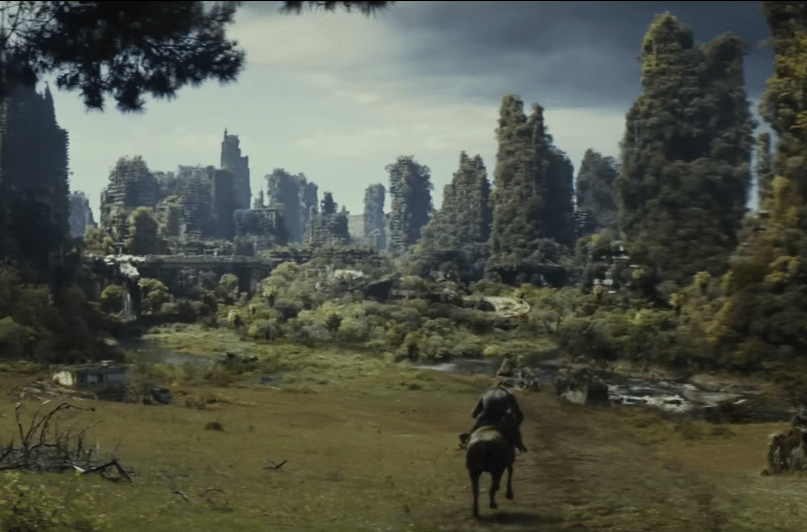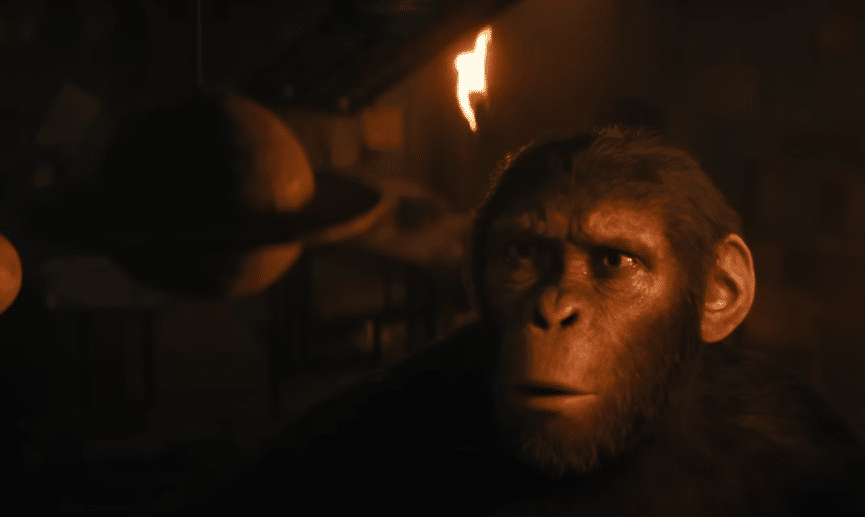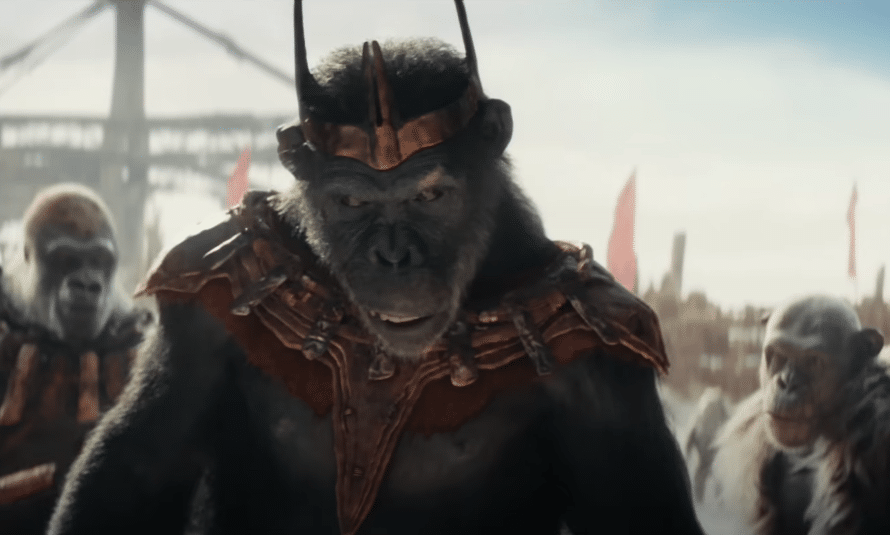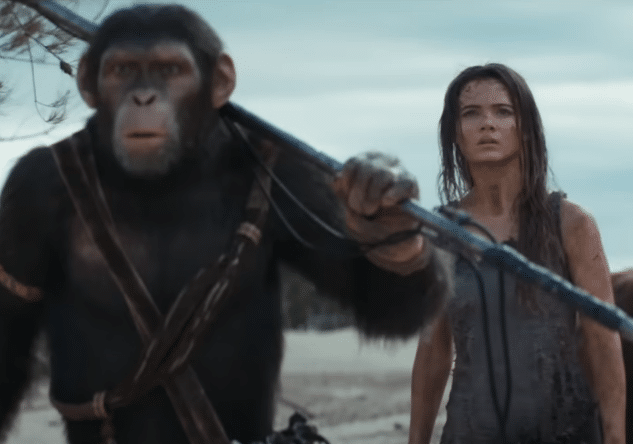Apes are still going strong. Seven years following the end of the Caesar trilogy, Wes Ball has successfully breathed new life into the Planet of the Apes saga.
Kingdom of the Planet of the Apes is the newest chapter in a reboot of the long running science-fiction series. Directed by Wes Ball, this entry jumps forward in time from the revolution of evolved, intelligent apes, and looks to the future of both ape and mankind.
For a series with such increasingly long-winded titles, Planet of the Apes is surprisingly straightforward. It’s a simple concept, really, “What if the world ended and apes were the next ones in line to rule it?” But for such a simple premise, the Apes franchise has presented some fascinating and thought-provoking questions. What is the value of intelligence? What separates humans and animals?
Not only does Kingdom further these questions, it also poses new ones.
Granted human intelligence, will another race be doomed to make the same mistakes?
And in a world where two races are capable of intelligent thought, is conflict inevitable?
After the End
Kingdom is set roughly 300 years after the events of the trilogy which began this latest iteration of the franchise.
Ancient History
Said trilogy centered on Caesar, a super-intelligent chimpanzee raised in a human laboratory. Granting his fellow test subjects the gift of intelligence, Caesar led them in a dramatic escape.
The rest of the story dealt with the tragic aftermath, with the same retrovirus that created Caesar proving lethal and contagious towards humans. From there, humanity and their civilization were largely wiped out. Caesar, for his part, led ape kind in a brief war for survival against the vengeful scraps of humanity.
In the end, the virus would mutate and further diminish what was left of humanity. Leaving apes to become the dominant species.
“Nothing beside remains…”

By the time of Kingdom, that time of revolution is long gone. The human race as it was has fallen into obscurity, with their once-proud cities making for both beautiful and tragic landmarks. Sweeping shots of the post-apocalyptic landscape bring to mind Shelley’s “Ozymandias”, and its lamenting of lost glories.
Director Wes Ball masterfully hurls the audience into a world in which Caesar has become legend. Most of the simian clans which rule this new world have some vague idea of who Caesar was, but not the full picture. Much like the “dark ages” in our own history, much has been lost.
The filmmakers’ deliberate choice to limit most of the characters’ knowledge accomplishes two things. First, it provides a relatively clean state for the new protagonists and gives them one whopper of a discovery to make. Second, it opens the door for a new story in Caesar’s wake.
The battle over his legacy.
Evolution
As the first of the evolved apes, Caesar is more or less their messiah by the time Kingdom takes place. His name inspires awe and terror, and his words are held as sacred.
And those who walk in his footsteps have the choice to use his legend for good, or for evil.
The Burden of Intelligence
Noa, young son of the “Eagle Clan”, knows little of Caesar when we first meet him. So for a good chunk of the film, our protagonist acts mostly on what he already knows, what he already believes.
Through him, we see how very much like humans the apes have become. Their ingenuity, creativity, and loyalty to fellow ape makes it easy to relate to Noa and his family, with actor Owen Teague’s earnest performance proving a worthy follow up to Andy Serkis’s Caesar.

But all is not well in the apes’ burgeoning kingdom. Intelligence, as with humans, proves both a blessing and curse. While some, like Noa, wish to embody the best of Caesar’s teachings and help those around them, others gladly twist their messiah’s words in the name of power and domination.
Enter Proximus. Played with fiendish glee by performer Kevin Durand, this self-proclaimed king of the apes fancies himself the true successor to Caesar. But instead of winning over others with good will, and inspiring loyalty, Proximus is content to wage a war of conquest and take the new world by force.
With an army at his back, and a cult of personality surrounding him day after day, Proximus is a proper post-apocalyptic warlord. At times, he wouldn’t feel too out of place in the worlds of Mad Max, or Fallout. More than that, for an ape he’s a remarkably human villain. Both in the manner in which he styles himself, and the means with which he forges his kingdom.

The Devil You Know
Yet, for all his cruelty and bloodthirst, Proximus presents a quandary for Noa.
While Proximus is a tyrant, he is an ape all the same. In his own twisted way, the king is trying to fashion the new world into one in which apes will not only survive, but thrive. He knows full well that long ago, apes were subservient to the human race. More than anything, Proximus is determined never to let that happen again.
Noa is right to oppose him. But with whom he allies with, to fight Proximus?
That might prove far more dangerous than the mad king himself.
Revolution
Noa’s ally on his long journey is, in fact, a human. A scavenger named Mae, played by Freya Allan of The Witcher fame. And while she proves helpful to Noa, she might not exactly prove trustworthy.
Mystery
For most of the movie, Mae is something of an enigma. Noa, and thus the audience, know little of Mae except for the fact that she’s capable of speech. Something most humans lack, thanks to the mutated retrovirus which caused the fall of the old world.
This mystery makes the alliance between her and Noa a tenuous one. We the audience are kept on our toes, wonder exactly what Noa has to lose or gain from working with this human. Or what she’s after.

Noa’s motives are clear. Fighting back against Proximus’s tyranny, and freeing his people. But Mae isn’t quite so forthcoming on what she wants.
Another chance?
So, naturally, we the audience are just waiting for some dramatic reveal. Because from the beginning of the rebooted Apes series, most relations between human and ape have ended in tragedy or violence. And as she still possesses a keen mind, Mae is fully aware the world once belonged to her kind. Not to the apes.
That division proves something of a problem for her and Noa as partners. The science-fiction genre, as a whole, often deals with themes of the human experience, and what it means to even be human. In the Apes saga, shared sentience blurs the line that separates human and ape.
And before the film is over, Noa and Mae are forced to ponder the conflict between their people. Sure, they’re partners now. But can that ever last?
In a masterful twist, Wes Ball introduces a greater, more existential crisis to the world of Kingdom and beyond. Noa and Mae, each a capable member of their race, have a choice to make. To repeat the mistakes of the past, or learn from them, and make a better world for human and ape alike.
Apes Together Strong
The quality of the film aside, its financial success speaks for itself. A strong box-office opening and positive word of mouth are almost certain to guarantee sequels, meaning it shouldn’t be long before we return to this epic saga again.
Between the Monsterverse’s Kong, and the descendants of Caesar, it’s a good time for those monkeys, at the movies.














